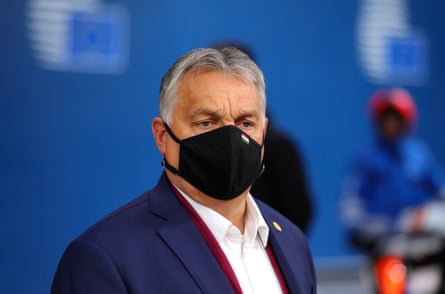Fortress Europe is being redesigned – but it is no easy task. European Union home affairs ministers on Thursday began the process of repairing the bloc’s broken migration policy, just weeks after the tragic devastation of the Moria refugee camp on Lesbos. Expect no quick changes, however. The 27 countries are deeply divided over proposals for a new “pact” on asylum and migration.
The European commission’s plan calls for faster pre-entry screening and quick returns of those who fail to quality for asylum. The focus is on ending sometimes deliberately slow, inhumane and inefficient border management procedures, which lead to squalid, overcrowded camps such as Moria, where people can be left in limbo for years. The return of those denied asylum could be managed with a newly appointed “EU returns coordinator”. EU data shows that on average approximately 370,000 applications are rejected each year, but only a third of people are expelled.
Ursula von der Leyen, the European commission president, is hoping that these and other changes will convince EU governments to view migration not as an evil but as an asset that has “defined our societies, enriched our cultures and shaped many of our lives”.
But Europe’s anti-migration hardliners are having none of it. The key concern of Hungary, Poland, Slovakia and the Czech republic is that refugees must be kept in “hotspots” or camps outside EU territory while asylum claims are processed, although – so far, at least – no one seems to favour Priti Patel’s bizarre scheme for sending asylum-seekers to Ascension Island in the south Atlantic.
Europe’s progressives, on the other hand, worry that the commission proposals pander too much to the far right. Rights agencies and NGOs warn that the pact may weaken protection for some of the world’s most vulnerable people.
EU polarisation over migration is not new. Germany and Sweden welcomed many of the 1.5 million refugees fleeing Middle Eastern wars five years ago, but the bloc’s eastern states looked the other way. Later they blocked EU efforts to introduce a system of quotas for redistributing refugees among the 27 member states.
The number of asylum seekers is now down, but for many EU governments the migration “crisis” will never be over. That is because the problem has never really been about numbers. Europe’s relentless arguments over border controls, asylum claims and mandatory or voluntary “solidarity” hide a darker discussion and a deeper divide.
Pride and prejudice are the real obstacles standing in the way of a well-managed EU policy on migration.
The migration discussion is entangled in Europe’s dismal record on racism, the rise in anti-Muslim sentiment and the continent’s complex post-colonial relations with its southern, especially African, neighbours. At stake is the EU’s commitment to democracy, human rights and the rule of law. Also at risk is the EU’s global reputation.
EU home affairs commissioner Ylva Johansson may say she wants to take the drama out of migration and make the the policy a “normal one”. But before they can agree on new migration rules, politicians and policymakers will have to tackle three closely related but seemingly unconnected challenges.
First, Europe must confront – and change - its biases on race, religion and ethnicity. Second, there should be an honest conversation on European values and identity. Third, Europe needs to acknowledge the urgency of rebooting relations with African states and other emerging countries.
By coincidence rather than by design, along with the migration proposals, all three questions are currently on the agenda. After Black Lives Matter protests erupted across Europe in May, von der Leyen vowed an array of actions to dismantle structural racism including ensuring more racial diversity in “Brussels So White” institutions. On values, although earlier attempts to impose sanctions on Budapest and Warsaw for breach of EU values are stuck, the EU executive is pursuing closer scrutiny of rule of law violations.
And after years of neglecting relations with Africa, there’s finally a much-needed EU focus on building a “partnership of equals” with the continent, although details are still being worked out.
These conversations are intimately connected to each other and to the debate on migration. They should be merged into one high-level reflection.

Beyond process, the urgent question that requires an answer is: who really speaks for Europe? Is it Viktor Orbán and his allies in the so-called Visegrad group of countries, which wants a closed, white Christian club; or is it von der Leyen waxing lyrical about constructing a “human and humane” anti-racist union? And can there be a true reconciliation of these starkly different – and competing – visions of Europe?
There is no easy response. Criticising Orbán’s hate-mongering antisemitic diatribes and rejection of an open “parallel society” where Muslims and Christians live together is easy. But more subtle forms of prejudice abound. The recent denunciation by the French president, Emmanuel Macron, of “Islamic separatism” or the nomination of an EU commissioner to “promote the European way of life”, viewed by many as a dog whistle to the anti-migrant camp, are more difficult to call out.
In the absence of the moral leadership required for a strong new narrative, that of a multiracial, multi-ethnic and multicultural EU, the bloc’s history and identity will continue to be based on ideas of exclusion and superiority: self-comforting myths where “true Europeans” stand in contrast to unwelcome outsiders and intruders.
None of this augurs well for a quick decision on the migration pact, even though the EU clearly needs migrants for their skills and talent but also as contributors to an ageing Europe’s coffers and pension systems. And the pandemic revealed just how many, “essential functions” across the continent are performed by “key workers” who are often migrants.
Portugal and Italy introduced temporary amnesty schemes for refugees while others fast-tracked work permits or allowed asylum seekers to work throughout their application process.
And while national governments dither even over the humanitarian taking-in of refugee children made homeless at Moria, local communities are responding at the grassroots level. A movement of German towns is arguing they can help alleviate the crisis on their own and has volunteered to bring in more asylum seekers. Even once-hardened anti-migrant German politicians have reportedly started promoting moderate views on migration amid evidence that despite far-right scaremongering refugees are integrating successfully.
Securing agreement on a new, more sensible and saner migration management system will be slow and painful. Johansson’s colleagues are unlikely to take up her suggestion to negotiate the new pact with “cool heads and warm hearts”. As the author Hanif Kureishi wrote in 2014: “The immigrant has become a contemporary passion in Europe, the vacant point around which ideals clash.”
Shada Islam is a Brussels-based commentator on EU affairs

